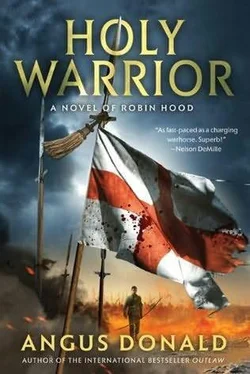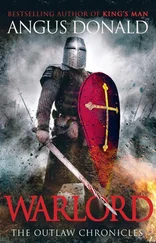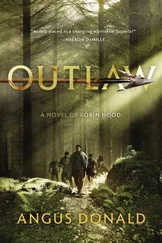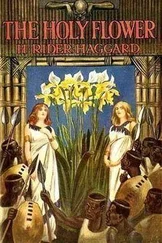Angus Donald - Holy warrior
Здесь есть возможность читать онлайн «Angus Donald - Holy warrior» весь текст электронной книги совершенно бесплатно (целиком полную версию без сокращений). В некоторых случаях можно слушать аудио, скачать через торрент в формате fb2 и присутствует краткое содержание. Жанр: Исторические приключения, на английском языке. Описание произведения, (предисловие) а так же отзывы посетителей доступны на портале библиотеки ЛибКат.
- Название:Holy warrior
- Автор:
- Жанр:
- Год:неизвестен
- ISBN:нет данных
- Рейтинг книги:3 / 5. Голосов: 1
-
Избранное:Добавить в избранное
- Отзывы:
-
Ваша оценка:
- 60
- 1
- 2
- 3
- 4
- 5
Holy warrior: краткое содержание, описание и аннотация
Предлагаем к чтению аннотацию, описание, краткое содержание или предисловие (зависит от того, что написал сам автор книги «Holy warrior»). Если вы не нашли необходимую информацию о книге — напишите в комментариях, мы постараемся отыскать её.
Holy warrior — читать онлайн бесплатно полную книгу (весь текст) целиком
Ниже представлен текст книги, разбитый по страницам. Система сохранения места последней прочитанной страницы, позволяет с удобством читать онлайн бесплатно книгу «Holy warrior», без необходимости каждый раз заново искать на чём Вы остановились. Поставьте закладку, и сможете в любой момент перейти на страницу, на которой закончили чтение.
Интервал:
Закладка:
Angus Donald
Holy warrior
Part One: England
Chapter One
I hesitated long before beginning this labour, and had resolutely made up my mind never to set down on parchment this part of my early life, until I heard a man in an ale-house in Nottingham the other day, a professional story-weaver, and a good one, extol the virtues of lionhearted King Richard and his brave warriors who made the Great Pilgrimage to the Holy Land more than forty years ago. The man described the magnificent killing-skill of the steel-wrapped Christian knights, and the deathless glory that they won against the Saracens at Acre and Arsuf; he spoke of the certain rewards in Heaven for those who fell in such a noble cause, and the rich rewards on Earth, in plunder and booty, for those who did not…
But this eloquent tale-spinner never mentioned the true sights, smells and sounds of a battlefield after a great victory — the ones that stay with you and plague your dreams. He did not speak of the corpses, thousands of them, chalk-faced and staring, stiffened by death and heaped like cut logs one on top of the other; nor the belly-slashed horses, stepping in their own entrails, eyes rolling, trembling and whinnying with fear; nor the iron-meat stench of fresh blood and spattered shit, an odour that coats the back of your throat and will not easily be washed away; nor the drone of a hundred thousand gore-glutted flies; nor the ceaseless, hopeless shrieking of the badly wounded that makes you yearn to stuff your ears against their pain.
He did not speak of the horror of killing a man close to; the wild kick of his death-writhe against your body, the stench of his onion breath on your cheek; the hot blood washing over your hand as you work the blade deeper into his flesh. And the sick dizziness and relief you feel when the deed is done and the man lies by your boots, suddenly no more than a loose bag of bones and meat.
The storyteller did not lie — and yet he did not tell the truth. And when I saw the eyes of the young men in that tavern shining in the firelight as they listened to his stories of bold Christian heroes carving their way through the ranks of cowardly unbelievers, I knew that I must set down the true events of that great endeavour four decades past, the true courses of those far-off battles, as I saw them with my own youthful eyes.
This is a not a tale of bold heroes and everlasting glory, it is a tale of useless slaughter and lakes of innocent blood; a tale of greed, cruelty and hatred — and of love; it is also a tale of loyalty and friendship and forgiveness. Most of all it is the tale of my master Robert Odo, the great Earl of Locksley, the man once known throughout the land as Robin Hood — a cunning thief, an ice-hearted murderer and, God forgive me, for many years my good friend.
As I inscribe this story of my long-ago journeying at a writing stand in the great hall at the manor of Westbury, I feel the crushing weight of my years. My legs ache from standing at my sloped lectern for so long. My hands, which grip penknife and quill, are cramped from hours of work. But our merciful Lord has spared me these past fifty-eight years, through much danger, battle and bloodshed, and I have faith that he will give me the strength to complete this task.
Through the wide open hall door, a light breeze steals in and stirs the rushes on the floor, wafting the warm scents of early autumn to where I scratch away at this parchment: the sun-baked dust of the courtyard outside, cut grass in my drying barns, and a tint of sweetness from the fruit that hangs heavy in my orchard.
It has been a fat year for us here at Westbury: a hot summer ripened the crops, and now they are all gathered in, and the granaries filled to the rafters with sacks of wheat, oats and barley; daily the cows give up their sweet milk, the pigs are gorging on beech mast in the woods, and Marie, my daughter-in-law, who runs this manor for me, is a contented woman. God be praised for his mercy.
In the spring, her cousin Osric, a portly widower of middle years, came here to occupy the position of bailiff, and he brought with him his two strong sons Edmund and Alfred to toil in my fields as waged farm hands. I cannot say that I like Osric: he may be the most upright, honest, hard-working fellow in Christendom, but he is as dull as unsalted spelt bread. Officious, too, when it comes to his dealings with my villeins. And yet, since his arrival at the manor, he has immeasurably transformed my life for the better. What was once a forlorn, untended estate of weed-choked fields and tumbledown buildings is now a bustling place of industry and plenty. He has collected those rents from my tenants that were long overdue; at harvest time he rose before dawn and chivvied into the fields the villeins of Westbury who owed me week-work, and arranged a modest daily payment for the franklins of the village who did not, but who were prepared to labour on my demesne. He has brought order and prosperity and happiness to the manor — and yet I still cannot like him.
It may be that I do not care for him because he is such an ugly man — round in the middle like a ball, with short arms and stubby fingers, and his face, under a nearly bald scalp, is pinched like a mole’s; his nose is too large, his mouth too small, and an expression of worry permanently haunts his tiny eyes — but I prefer to think it is because he has no music in his soul, no wild untamed joy in his heart.
Nevertheless, Osric’s coming has been a good thing. Last year, a melancholy air had pervaded the manor. Marie and I were both struggling to find a reason to carry on living after the death from a sickness of my son, her husband Rob. God be praised we have a living memory of him in my grandson and namesake Alan, who will be eight years old this Christmas — a healthy, raucous little boy.
Alan is in thrall to Osric’s younger son Alfred. He looks on the young man as a hero, a kind of demigod, and he copies everything the tall farmhand does. Alfred had taken to wearing a band of linen around his brow, to catch the sweat before it dripped into his eyes as he worked his sickle on the standing wheat. And so, of course, little Alan must fashion a similar cloth headband for himself, too. When Alfred let slip that he was fond of buttermilk, Alan began following him around with a pitcher of the liquor in case he might be thirsty. Harmless boyish foolishness, you will say. Possibly, but I have decided that I will soon send Alan away to be educated in accordance with his rank at another manor far away. There, he will learn to ride and fight like a knight, and dance and sing, and write Latin and French: I do not want him growing up to be a field hand. This infatuation with Alfred may well be harmless but I know that blind admiration of an older man by a younger fellow can cause great anger and hurt when the boy discovers that his idol is not the hero that he seems. I had that very experience myself with Robin of Locksley.
My master first appeared to me as a heroic figure: brave, strong and noble — just as Alfred might appear to young Alan — but I remember well the sickening lurch in my belly when I learnt that Robin was not so, that he was as grasping and cruel and selfish as any other mortal man.
I know that am not being just to Robin, when I castigate him for being selfish, cruel and greedy: it was I who misunderstood him, not he who deliberately tricked me. But I still feel rancour, and shame, when I remember the good and noble men who died so that Robin might gain riches. But those who read these parchments shall judge for themselves, and in these pages I shall write as truly as I am able about Robin’s adventures beyond the sea, and mine, in that hate-ridden land where men butcher each other by the thousand in the name of God, that country of crushing heat and choking dust, of demon scorpions and giant hairy spiders — the place that men call Outremer.
Читать дальшеИнтервал:
Закладка:
Похожие книги на «Holy warrior»
Представляем Вашему вниманию похожие книги на «Holy warrior» списком для выбора. Мы отобрали схожую по названию и смыслу литературу в надежде предоставить читателям больше вариантов отыскать новые, интересные, ещё непрочитанные произведения.
Обсуждение, отзывы о книге «Holy warrior» и просто собственные мнения читателей. Оставьте ваши комментарии, напишите, что Вы думаете о произведении, его смысле или главных героях. Укажите что конкретно понравилось, а что нет, и почему Вы так считаете.












